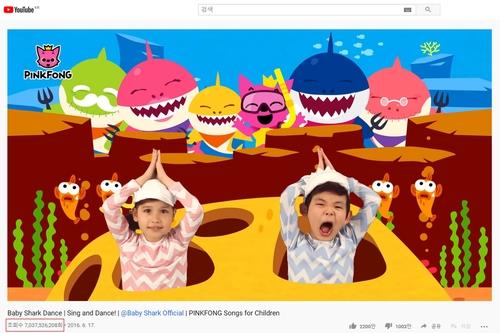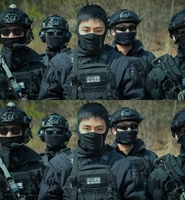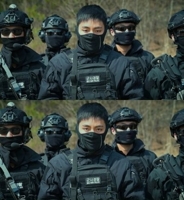(LEAD) Court rules against U.S. composer in plagiarism suit over 'Baby Shark'
(ATTN: UPDATES with more details in last 4 paras)
SEOUL, July 23 (Yonhap) -- A Seoul court on Friday ruled against an American composer in a plagiarism suit he brought against the producer of the popular South Korean children's song "Baby Shark" two years ago.
The Seoul Central District Court rejected a claim by New York-based composer Johnny Only that "Baby Shark," a world-famous song released by South Korean education startup SmartStudy in 2015, copied his 2011 song.

This photo, provided by SmartStudy, shows a screenshot of the video "Baby Shark Dance" on YouTube. (PHOTO NOT FOR SALE) (Yonhap)
The rhythmic two-minute song featuring a shark family and their underwater hunt for small fish has gone viral in cyberspace and on the small screen at home and abroad. "Baby Shark Dance," a sing-and-dance video for the megahit children's song, has racked up more than 9 billion views on YouTube.
Only, whose legal name is Jonathan Wright, filed a lawsuit with the Seoul court in March 2019, claiming that the South Korean song plagiarized his own song "Baby Shark" remade in 2011 with a unique rhythm to an orally transmitted folk song.
But SmartStudy has rejected the plagiarism claim, saying its song was a recreation of a traditional North American children's song that has no valid copyrights.
Only's side last month expressed an intention to withdraw its lawsuit through its lawyer here. But SmartStudy disagreed. A local court has to reach a verdict if the plaintiff declares an intent to drop the case, but the defendant does not agree.
"The Korea Copyright Commission asked to review the case said it is difficult to acknowledge that the plaintiff's song added a new creative element to the traditional song," the court said.
"Even if the plaintiff's song is recognized for creativity as a new work, it is difficult to view that the defendant violated the plaintiff's copyright," it said.
The Korea Copyright Commission reportedly said it is difficult to believe that Only's song added new accompaniment to the traditional song. Instead, the American composer merely added an instrument while expressing the same and similar accompaniment, the commission reportedly said.
ycm@yna.co.kr
(END)
-
 Overdue debut of Korean abstract art pioneer Yoo Young-kuk at Venice Biennale
Overdue debut of Korean abstract art pioneer Yoo Young-kuk at Venice Biennale -
 Defense chief says N. Korea's hypersonic missile 'unsuccessful' in last-stage glide flight
Defense chief says N. Korea's hypersonic missile 'unsuccessful' in last-stage glide flight -
 Relax, immerse yourself in scents at Venice Biennale's Korean Pavilion
Relax, immerse yourself in scents at Venice Biennale's Korean Pavilion -
 N. Korea has capability to genetically engineer biological military products: U.S. report
N. Korea has capability to genetically engineer biological military products: U.S. report -
 S. Korea marks 30th anniv. of Korean Pavilion at Venice Biennale with contemporary art
S. Korea marks 30th anniv. of Korean Pavilion at Venice Biennale with contemporary art
-
 Overdue debut of Korean abstract art pioneer Yoo Young-kuk at Venice Biennale
Overdue debut of Korean abstract art pioneer Yoo Young-kuk at Venice Biennale -
 Relax, immerse yourself in scents at Venice Biennale's Korean Pavilion
Relax, immerse yourself in scents at Venice Biennale's Korean Pavilion -
 Artist Lee Bae captures ethereal Korean aesthetics at Venice Biennale
Artist Lee Bae captures ethereal Korean aesthetics at Venice Biennale -
 S. Korea marks 30th anniv. of Korean Pavilion at Venice Biennale with contemporary art
S. Korea marks 30th anniv. of Korean Pavilion at Venice Biennale with contemporary art -
 Defense chief says N. Korea's hypersonic missile 'unsuccessful' in last-stage glide flight
Defense chief says N. Korea's hypersonic missile 'unsuccessful' in last-stage glide flight
-
 Facebook page unveils photos of BTS member V in counter-terrorism unit gear
Facebook page unveils photos of BTS member V in counter-terrorism unit gear -
 Gov't likely to accept university chiefs' request to lower med school enrollment quota
Gov't likely to accept university chiefs' request to lower med school enrollment quota -
 S. Korea not invited to G7 summit meeting this year: sources
S. Korea not invited to G7 summit meeting this year: sources -
 N. Korea says it conducted 'super-large warhead' test for strategic cruise missile
N. Korea says it conducted 'super-large warhead' test for strategic cruise missile -
 Yoon's approval rating sinks to lowest point since taking office
Yoon's approval rating sinks to lowest point since taking office





















